2016 Ducati 959 Panigale First Ride Review + Video
In the presentation for the 959, Ducati described its new bike as having “perfect balance,” which is a descriptor I immediately dismissed as pure PR speak. After all, every OEM would want to say that about one of its new products, but after having spun laps on the latest Panigale at the Ricardo Tormo MotoGP circuit, I’m becoming a believer in this Italian balancing act.
2016 Ducati 959 Panigale
| Engine | 18.5/20 |
| Suspension/Handling | 13.5/15 |
| Transmission/Clutch | 9.0/10 |
| Brakes | 8.5/10 |
| Instruments/Controls | 4.5/5 |
| Ergonomics/Comfort | 8.25/10 |
| Appearance/Quality | 9.25/10 |
| Desirability | 9.0/10 |
| Value | 8.5/10 |
| Overall Score | 89/100 |
The 959 impresses for being fun and thrilling but without the occasional bits of terror like one gets from the mega Panigale 1299’s 205 crankshaft horsepower. But don’t think the little-ish Panigale is slow. It spits out 157 purported ponies, which proves to be enough to whip up 164 mph on the 959’s monochrome LCD gauges when hammering down the front straight of the Spanish circuit.
The 959 is the offshoot of the 899, which isn’t yet even old enough to enter preschool – the 899 was introduced as an all-new model just two years ago. Meanwhile, consider most 600cc Japanese sportbikes haven’t been updated since the 2000s. A 3.6mm stroke extension (to 60.8mm, the same as the 1199 Panigale) brings up capacity to 955cc. You’ll notice that’s 4cc less than the name indicates, which follows the latest trend of Ducati nomenclature for a model name to end in a numeral 9 regardless of actual displacement – the 899’s actual engine size is 898cc. New secondary showerhead injectors are employed to help boost top-end power by 6%. Torque production is flexed by 8%, now up to 79.2 lb-ft.
The 959 gets several handy hand-me-downs from its 1299 brother, including its revised fairing, slightly taller windscreen and updated tailsection. It also receives the 1299’s clutch and its slipper function, but with lighter springs. A slipper clutch might seem superfluous with Ducati’s adjustable Engine Brake Control electronics, but, according to Paul Ventura, Marketing Product Manager, the market had specifically asked for one. The 1299 also donates its larger (60mm) header pipes and 4mm lower swingarm pivot, the latter which results in better traction out of corners and a wheelbase 5mm longer.
What you won’t see are the 1299’s single-sided swingarm, Brembo M50 calipers or fancy TFT color instrumentation.The 899’s double-sided aluminum is new for 2016 to accommodate the Euro-spec mufflers, while Brembo’s M432 monoblock calipers and 10mm smaller rotors save a few lire over the 1299’s stellar M50s.
More details of millimeters in the transition from 899 to 959 can be found in this preview article, which allows me to delve quicker into the little ’gale’s riding impressions.
Riding in Lorenzo Land
Spaniard Jorge Lorenzo took victory in the MotoGP race just a few weeks before I arrived in Valencia, earning himself the world championship in a controversy-filled season finale. And what a workout it must be to hammer for 30 laps aboard a 250-hp motocicleta at this diminutive Spanish bullring.
Riding Ducati’s 959 was enough of a workout for little ol’ me. Ducati says the 959’s dry weight is up quattro pounds over the 899, which we scaled at 437 lbs full of fuel when we compared it to a GSX-R750 and MV Agusta F3 800. And, of what is criticizable about the 959, its weight is one of just a few. Its class competitors are more than 10 pounds lighter.
The 959’s handling is better described as deliberate than quick. A non-adjustable steering damper is at least partly to blame for its moderate sluggishness, a condition a rider can feel even at rest. On the flip side, the 959 boasts unflappable stability, allowing its pilot to rail through high-speed corners with confidence the rail continues to – and through – the apex, even under full power.
Speaking of power, there is plenty. Crucially, midrange grunt is more abundant than in its predecessor, the 899, which was so peaky as to be un-V-Twin-like. The 959’s powerband fills in many of the irksome holes, re-engaging the torque-rich power spread that have earned Ducati engines their lovable reputation over the decades.
The 899’s engine felt obscenely flaccid for a V-Twin below 8000 rpm, and while the 959 still likes to run for its redline (10,500 rpm), its midrange has been invigorated. Ducati says the 959’s torque-to-weight ratio is up 4%, enabling some fun second-gear clutch wheelies at the track.
Electronic rider aids make up a big part of the 959’s riding experience – they’re plentiful and excellent. Ride modes of Wet, Sport and Race are programmed with appropriate traction control (DTC), ABS and engine-brake control (EBC) to suit the intended use; each can be customized to suit rider preferences.
We started the day in Sport mode, which offers smooth throttle application and – in its default settings – a lower threshold before ABS and traction-control interventions. They didn’t intrude much until the pace picked up to A-group trackday levels, when ABS kicked in over the braking bumps entering Turn 1. DTC intervention wasn’t overtly intrusive in its fifth of eight levels.
Switching to Race mode made the electronic aids almost invisible. ABS is still in play, but its threshold is much higher, and rear-lift mitigation is turned off. Meanwhile, DTC 3 allows some rear drifting before softly reining it back. Throttle response in Race mode is sharper but not too abrupt.
Exiting Valencia’s last corner is a good place to begin describing how the electronics work in a rider’s favor. While DTC is warding off highsides in second gear, the standard quickshifter clicks upshifts at full throttle and without the use of a clutch lever. Red shift lights at the top of the gauge pack look like devil horns as they signal the perfect time to prod the shifter and spur you on to higher speeds.
Turn 1 approaches at more than 160 mph in sixth gear. ABS keeps the front end from locking even as the rear tire is dancing above the track’s surface. The Brembos are reasonably powerful, but they’re a little soft when compared to the bite from the 1299’s ferocious M50 setup.
The new slipper clutch dramatically eases downshifts, even if a rider is sloppy or lazy with blipping the throttle for the three ratios dropped entering the 100-mph Turn 1. But it’s the EBC that most impressed me. EBC 1 has the most engine braking, and I found it made corner entries less smooth than ideal. A click to EBC 2 made a fairly dramatic improvement to calm entries, and the maximum of EBC 3 suited me perfectly. It’s quite a treat to be able to tune a powertrain as finely as this with just a few presses of buttons. I can imagine an era when forms of EBC make the added weight and cost of slipper clutches obsolete.
Conclusion
Anyone who knows me understands that I’m a rider who enjoys power, and I’ve been known to say that I’d enjoy any motorcycle to a greater extent with 10% more power. Well, that assertion might be fading. I’m claiming here that I might – perhaps, maybe – prefer to be on the 959 Panigale at a tighter track like Valencia than the 1299 version. There’s a deep satisfaction in being able to hold a throttle pinned for more than a few seconds, and the 959 strikes an enviable balance between a moderately fast bike and a scarily fast bike.
It’s difficult to imagine a $14,995 Italian sportbike being a strong value, but it would be easy to convince an 899 owner it’s a bargain. The 959 offers considerably more power and some better hardware for the exact same MSRP as the 899.
The 959 Panigale looks almost identical to a 1299 Panigale, which is one of the sexiest sportbikes on the market but costs many thousands of dollars extra. And only the hardest of hardcore riders would be wanting for more power. I’d say Ducati has struck the perfect balance it was intending.
2016 Ducati 959 Panigale
+ Highs
- Italian supermodel looks
- Excellent electronics
- Bargain priced in a strange way
– Sighs
- Kinda heavy
- All Brembos aren’t created equally
- $15k still ain’t cheap
2016 Ducati 959 Panigale Specifications | |
|---|---|
| MSRP | $14,995 |
| Engine Type | Superquadro: L-twin cylinder, 4 valve per cylinder, Desmodromic, liquid cooled |
| Bore and stroke | 100.0 x 60.8 mm |
| Capacity | 955 cc |
| Horsepower (claimed) | 157 hp at 10,500 rpm |
| Torque (claimed) | 79.2 lb-ft at 9,000 rpm |
| Fuel system | Mitsubishi electronic fuel injection system. Twin injectors per cylinder. Full Ride-by-Wire elliptical throttle bodies |
| Exhaust | 2-1-2 system with catalytic converter and 2 lambda probes. Stainless steel pre-silencer + twin aluminium side mufflers** |
| Clutch | Slipper and self-servo wet multiplate clutch with hydraulic control |
| Transmission | 6-speed with Ducati Quick Shift |
| Final Drive | Chain; Front sprocket 15; Rear sprocket 43 |
| Chassis | Monocoque aluminum |
| Front Suspension | Fully adjustable Showa BPF fork. 43 mm chromed inner tubes; 120mm travel |
| Rear Suspension | Fully adjustable Sachs unit. Aluminum double-sided swingarm; 130mm of travel |
| Front Brakes | Dual 320 mm semi-floating discs, radially mounted Brembo monobloc M4.32 4-piston callipers, with Bosch ABS as standard |
| Rear brake | 245 mm disc, 2-piston calliper, with Bosch ABS as standard |
| Front Wheel | 10-spoke light alloy 3.5”x17” |
| Rear Wheel | 10-spoke light alloy 5.50” x 17” |
| Front Tire | Pirelli Diablo Rosso Corsa 120/70 ZR17 |
| Rear Tire | Pirelli Diablo Rosso Corsa 180/60 ZR17 |
| Saddle height | 32.5 inches |
| Rake | 24° |
| Trail | 96mm (3.78 in.) |
| Wheelbase | 65.3 in. |
| Curb Weight (claimed, US-spec) | 430 lbs |
| Fuel Capacity | 4.5 gallons |
| Electronics | DTC, DQS, EBC, Riding Modes, Power Modes, R-b-W |
| Warranty | Two-year unlimited mileage |
| Optional Equipment | DDA+ with GPS-ready |
| Color Options | Ducati Red, Arctic White Silk (+$300) |
More by Kevin Duke



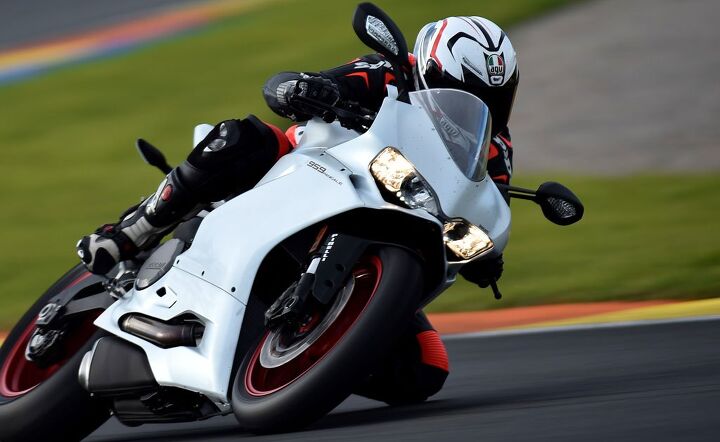
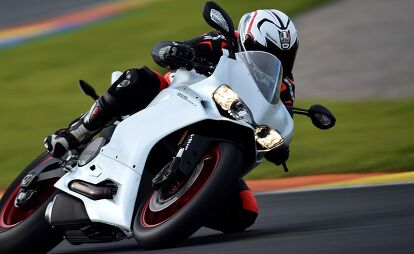





















































































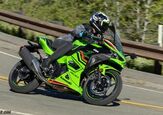
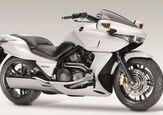
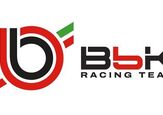
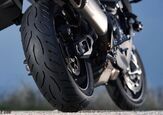
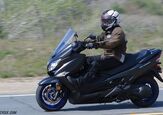
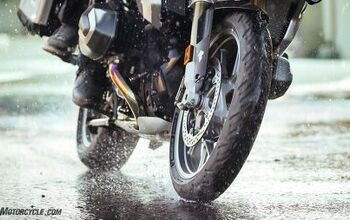
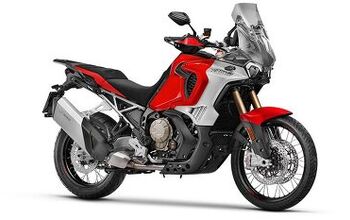
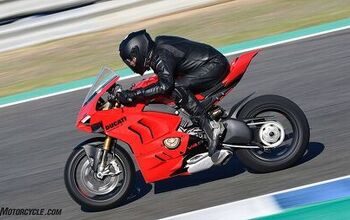
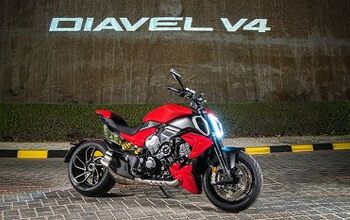
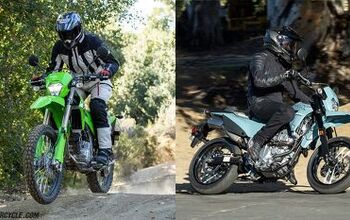
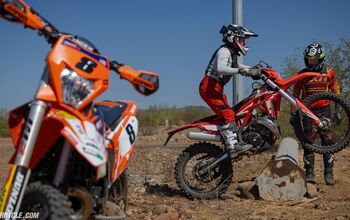
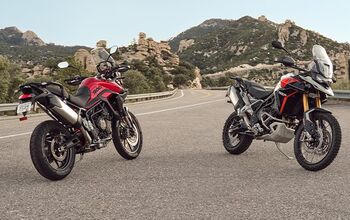
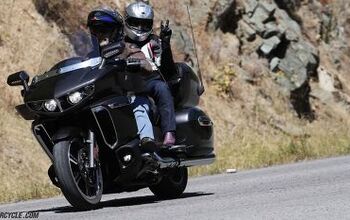
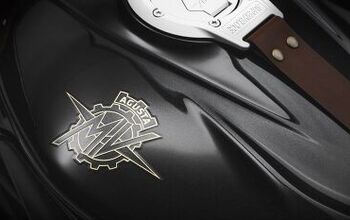
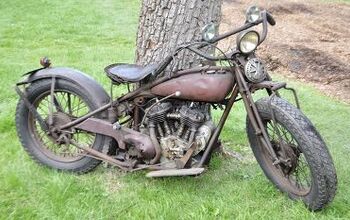
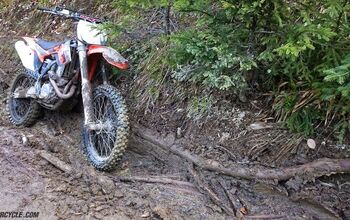
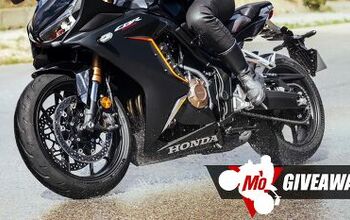
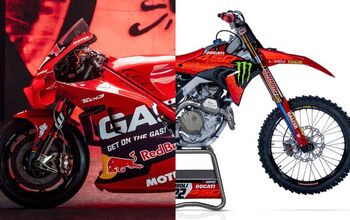

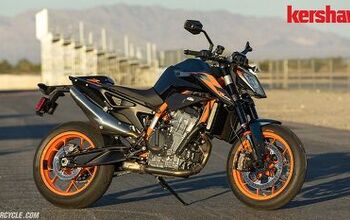
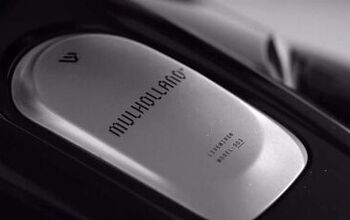
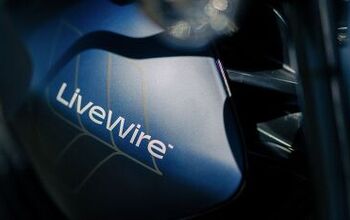

Comments
Join the conversation
Will you be doing any testing of this bike in California soon? I would like to know how it stacks up in the canyons.
No Black available? Why not?